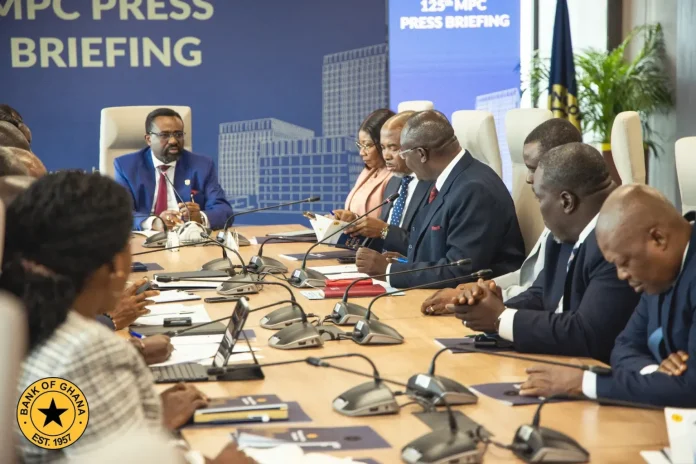
The Bank of Ghana expressed confidence in the country’s economic recovery on Monday as its Monetary Policy Committee (MPC) convened for the 127th time, with officials pointing to falling inflation, steady growth, and improving external buffers.
Governor Johnson Pandit Asiama told delegates the economy had turned a decisive corner, with headline inflation dropping to 8 percent in October 2025 and core inflation holding between 5 and 7 percent. The cedi has remained broadly stable, supported by foreign exchange market reforms, strong trade inflows, and rising reserves.
Gross international reserves climbed to $11.41 billion, equivalent to 4.8 months of import cover, and officials project the figure will reach five months by year’s end. Economic growth is broadening, with gross domestic product expanding 6.3 percent in the first half of 2025 while non-oil sectors surged 7.8 percent. High frequency indicators, including the Composite Index of Economic Activity, rose about 9 percent, and business and consumer sentiment remains positive.
“This performance shows the economy is gradually shifting from recovery to expansion,” Asiama said. He credited disciplined fiscal management, a cautious monetary stance, and structural reforms for the turnaround. The upcoming 2026 Budget is expected to reinforce this momentum, focusing on growth and job creation.
Central bank projections indicate steady expansion through 2026, supported by services, industry, and agriculture. A strong harvest, improved food supply, greater foreign exchange liquidity, and an easing credit environment are expected to sustain growth. Inflation is likely to settle between 4 and 6 percent by year’s end, potentially marking the start of a multi-year period of price stability.
Despite the optimism, Asiama warned that risks remain, including global commodity price swings, geopolitical tensions, and tighter external financial conditions. Domestically, taxes, utility costs, and high credit prices continue to challenge businesses.
The governor highlighted three key priorities for the MPC: the pace of disinflation and real interest rates, foreign exchange market reforms and reserve diversification, and financial sector stability with effective credit transmission. While most banks remain sound, some institutions still face asset quality and recapitalization pressures.
“The task before us is to protect stability while supporting real sector recovery,” Asiama said. “Our decisions must reinforce confidence, signal predictability, and keep Ghana on a path toward higher, job rich growth.”
In September 2025, the MPC cut the policy rate by 350 basis points to 21.5 percent, down from 25 percent in July 2025. The committee is expected to announce its latest policy decision on Wednesday, November 27, following the conclusion of its three day meeting.
Dr. Asiama assumed office as Bank of Ghana Governor on February 3, 2025, following his nomination by President John Dramani Mahama. He previously served as Second Deputy Governor between 2016 and 2017 and holds a doctorate in economics from the University of Southampton.
